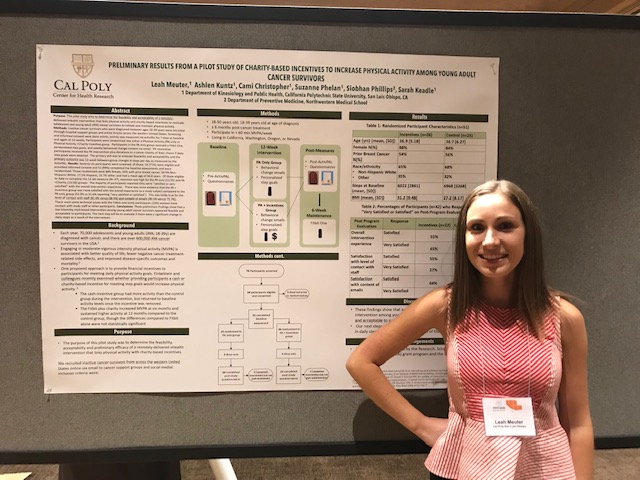Senior Earns NIH Fellowship
 Leah Meuter, a senior kinesiology major, has been accepted into a prestigious post-baccalaureate fellowship at the National Institutes of Health Clinical Center in Bethesda, Maryland. She will conduct research and assist with patient coordination and care at the leading clinical research hospital in the country.
Leah Meuter, a senior kinesiology major, has been accepted into a prestigious post-baccalaureate fellowship at the National Institutes of Health Clinical Center in Bethesda, Maryland. She will conduct research and assist with patient coordination and care at the leading clinical research hospital in the country.
Meuter spent three years conducting research at Cal Poly and played an instrumental role as the lead student assistant on a study led by Professor Sarah Keadle.
“I was so lucky to meet Leah during my first year at Cal Poly. She has such a unique skill set in that she has a natural rapport with patients and strong clinical experience along with the intangibles like grit, composure and independence that you look for in a great researcher,” Keadle said.
The project focused on testing whether incentivizing young adult cancer survivors to meet step goals through donations to cancer charities would increase physical activity. Meuter found that the eHealth intervention was feasible and acceptable to young adult cancer survivors and that the charity donations increased satisfaction with the intervention and steps.
Meuter presented her research at the College of Science and Mathematics Student Research Conference, the Society of Behavior Medicine meeting in Washington, D.C., and regional and national conferences of the American College of Sports Medicine (ACSM). In June, she will be one of three kinesiology seniors who will compete in the ACSM Student Bowl against 12 other regions in a Jeopardy-style competition on the topic of exercise science.
In the interview below, Meuter credits her research experience as changing her career trajectory and preparing her for the real world.
Interview with Leah Meuter
What has been the best part about being involved in research?
It's hard to choose just one! I feel like my favorite part about being involved in research was that it prepared me for the real world. You learn how to collaborate with peers and professors, how to present yourself in a professional manner, and how to keep your composure when things do not go as planned — because that will happen.
I think these skills are extremely important for other areas of life, and they are not skills that can be taught — they come with experience. Another really great part about research and attending conferences is the connections you make. You meet peers, professors and other researchers who you might not have met if you were not involved. These connections are great because they create a sense of community and a place where you can share your passion with others.
What was the best part of this study in particular?
The best part about this study was getting to interact with the participants, who were young adult cancer survivors. These participants were extremely kind and grateful despite what they had gone through, and it was really rewarding to help these participants get involved in physical activity and give them the tools they needed to create healthy habits and improve their quality of life.
What was the most challenging part?
I think the most challenging part about research is accepting that not everything will go as planned and you have to be willing to adapt to changes quickly. While this is the most challenging part in my opinion, I think that learning to work through challenges is one of the best things about research. I think that these challenges really help prepare you for the real world, whether it’s research-related or not, and how to deal with unexpected changes in a professional manner.
In what way, if any, has research changed your career path?
Research has dramatically influenced my career path. When I first got to Cal Poly, I was dead set on a career path that I do not think I would have enjoyed in the long-term. After my involvement in research for three years at Cal Poly, I realized that I did not want my research experience to end when I graduate in June.
This led me to apply for a two-year post-baccalaureate program through the National Institutes of Health (NIH) in which I will be working in the research hospital on the NIH campus. I am not yet entirely sure what I would like to do after this. However, I am extremely interested in the integration of research and clinical settings in the medical field. Had I not been involved in research at Cal Poly, I am sure my career path would have been entirely different.
Any other comments?
I am extremely grateful to be part of a college and department that values the importance of research, especially at the undergraduate level. I would strongly suggest to anyone who is the slightest bit interested in research to take advantage of the countless opportunities we have in our college and department. There are so many undergraduates who never get these opportunities. Finding something that interests you and being a part of a research project is such a great experience and can help you discover your passion.

